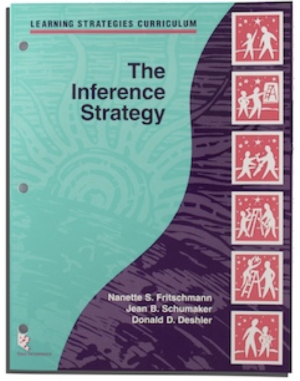The Inference Strategy

The Inference Strategy helps older students make inferences about information they have read and answer inferential questions. Students learn to identify key words in questions or invent their own questions to help them search for important information as they read a passage, determine what type of question they need to answer, think about what they already know about a topic, find clues in the reading passage that will help them answer the questions, look for additional information, and answer the question.
In field tests, students who learned the Inference Strategy earned scores on a standardized reading comprehension test that were on average three grade levels higher after instruction than before.
Associated mnemonic learning device: INFER - helps you understand that when you "infer" something, you are making a deduction based on information given, not explicitly stated
Author(s):Nanette S. Fritschmann, Jean B. Schumaker, and Donald D. Deshler
Publication and Purchasing Information: University of Kansas, Center for Research on Learning / KU CRL Online Store
Resources:
- Learn more: Inference Strategy FAQ website
- Research on the Inference Strategy (.pdf)
- Inference Strategy Research Video link
Research Articles:
- Fritschmann, N. S., Deshler, D. D., & Schumaker, J. B. (2007). The effects of instruction in an inference strategy on the reading comprehension skills of adolescents with disabilities. Learning Disability Quarterly, 30(4), 245-262.
https://doi.org/10.2307/25474637.
Results of this multiple-baseline across-subjects study indicate students with disabilities can learn to use a strategy to answer inferential questions.
The Story Behind the Inference Strategy from author Nanette Fritschmann
As a classroom teacher, I had become increasingly concerned that the many students with mild/moderate learning disabilities whom I had the pleasure of knowing were not learning at the rate and pace that would allow them to feel successful academically. In this role, I began to observe how many teachers often felt that they didn’t have the skills or tools to address the needs of such students. I longed to find better, more effective teaching techniques to allow all students to learn. I began to use the Learning Strategies Curriculum to meet the specific needs of my students. Various students not only began to be successful with academic tests in school (i.e. vocabulary tests, reading quizzes, etc.), but they actually began to generalize complex thinking skills outside of the academic environment. I became inspired to address issues that were becoming increasingly important in our current educational environment. This experience as a teacher started me on the path that would lead me to develop the Inference Strategy.
With the expansion of standards-based reform and assessment-based accountability commonplace in our nation’s schools, I began an attempt to understand what types of skills our students were being asked to demonstrate. Through my research and the work of colleagues, a pattern began to appear. I learned that all students are being held accountable for using specific reading comprehension skills. Two main categories of comprehension processes are required: those at the literal level and those at the inferential level. I also began to observe the various ways that teachers addressed these types of skills in both elementary and secondary classrooms. As expected, elementary teachers addressed many of the requisite skills using a variety of techniques and practices. In contrast, given the focus of presenting content in secondary learning environments, reading instruction was not a focus of instructional time in secondary classes. Based on these understandings, I began to develop a method for teachers to use to provide explicit, systematic instruction in literal and inferential comprehension processing to give all students the skills they need to be successful. My goal was to develop an instructional program that could be used within typical English language arts classes that was aligned with current educational practices and content standards.
Author's Thoughts about Inference Strategy Instruction
I have been fortunate enough to observe teachers with various levels of experience in different regions of the country teach the Inference Strategy to their students with and without disabilities in both middle- and high-school settings. Each time, I have seen students engaged and interested in applying a strategic method to reading materials that they may have considered unapproachable in the past. I have seen students with disabilities and underperforming students celebrate their improvements in reading and “show off” their improved performance or scores. I believe that today’s educators are facing tough challenges each and every day and that we must find a way to address these challenges in the most efficient manner possible. I believe that the Inference Strategy program is a program that does just that.
Teacher and Student Feedback on the Inference Strategy Instruction
By and large, the feedback from teachers who have implemented instruction in this strategy has been extraordinarily positive! Also, teachers have commented on how this program is really a combination of skills that many other programs address. The difference between this program and others is that this program is a way to address the various levels and combinations of skills that our diverse learners bring to our classrooms. Also, teachers have commented on how the program helps them to structure their discussion around reading materials in order to maximize instructional time. Teachers have reported a deeper understanding of higher level reading comprehension processes, which in turn has helped them teach more effectively. Further, students have made statements like, “Finally, here is something that will help me get through this stuff!”
Please note that professional development, coaching, and infrastructure support are essential components to effective implementation of SIM instructional tools and interventions. It is highly recommended that you work with a SIM professional developer. An Online Professional Development Course is available for this strategy.
An accessible version of the documents on this site will be made available upon request. Please contact the KU CRL Professional Development Research Institute, at simpd@ku.edu to request the document be made available in an accessible format.